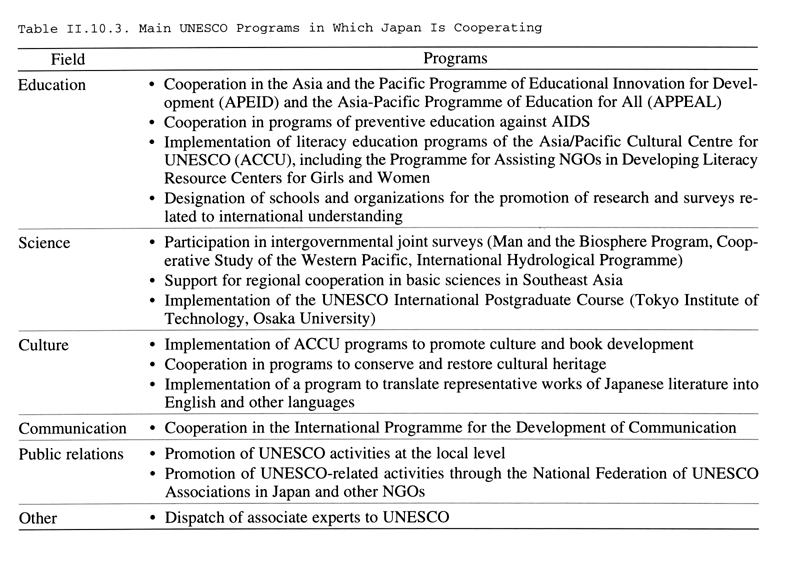| Home > Policy > White Paper, Notice, Announcement > White Paper > JAPANESE GOVERMENT POLICICIES IN EDUCATION, SCIENCE AND CULTURE 1994 > PART II Chapter 10 Section 3 5 | ||
UNESCO is a specialized agency of the United Nations that promotes international cooperation in education, science, and culture. Japan places a high value on the goals of this organization and actively participates and cooperates in various UNESCO-related programs ( Table II.10.3 ).
In the field of education, in fiscal 1994 Japan launched the Programme for Assisting NGOs in Developing Literacy Resource Centers for Girls and Women, to be implemented by the Asia/Pacific Cultural Centre for UNESCO (ACCU), with the aim of contributing to literacy education in the Asia-Pacific region. It is also Japan's policy to cooperate through UNESCO in educational programs to prevent AIDS. In the field of natural science, Japan is contributing to the solution of global environmental problems through participation in intergovernmental joint surveys in such areas as oceanography and ecology. In the field of culture, Japan is cooperating in several projects to preserve tangible and intangible cultural heritage. It also hosts a number of international conferences related to these preservation activities.
The National Federation of UNESCO Associations in Japan and other organizations are actively conducting UNESCO activities and nongovernmental international exchange programs, including fund raising for cooperation in literacy education.

About two-thirds of the more than 900 million illiterate adults in the world are women. In developing countries women have less access to basic education than men, and consequently women's literacy rates are lower than men's. This constitutes an obstacle to social development. Eradication of illiteracy among women is an urgent problem that requires global action. The International Literacy Year (1990) has prompted increased efforts in this area, and a variety of cooperation programs have been implemented by UNESCO and other international organizations to promote literacy. Japan participates and cooperates in UNESCO's education cooperation programs, entrusts funds to UNESCO for literacy education programs, and implements various ACCU programs. Thus, Japan is actively contributing to the promotion of literacy in the Asia-Pacific region. In fiscal 1994 the ACCU launched the Programme for Assisting NGOs in Developing Literary Resource Centers for Girls and Women. Under this program the ACCU will help set up literacy resource centers for girls and women in developing countries in the Asia-Pacific region in cooperation with nongovernmental organizations. In addition to developing "hardware" in the form of literacy education facilities, the program is designed to provide cooperation in "software" aspects through the training of literacy education instructors and the production and distribution of literacy teaching materials. |
The OECD is an international organization dedicated to consultation, deliberation, and coordination on issues of common concern to developed countries. These aims are achieved through international cooperation, exchange, and information sharing in various fields of economic activity in the broad sense, including education and science. In the field of education, the OECD has established an education committee to exchange information concerning policy issues in various countries and has set up the Center for Educational Research and Innovation (CERI), which conducts comparative research.
The Ministry of Education, Science and Culture is cooperating actively in education-related OECD programs through participation in conferences and sponsorship of international symposiums in Japan. Since fiscal 1992 the Ministry and the OECD have jointly organized an annual conference of experts in Japan. The theme of the 1994 conference was lifelong learning.
APEC * deals with educational issues through the APEC Education Forum. The Ministry of Education, Science and Culture participates and cooperates in various activities, including teacher training and mathematics curriculum projects. APEC activities in the field of education are becoming increasingly important. Japan is currently promoting the APEC Educational Exchange Project in the field of higher education, which Japan proposed in fiscal 1994.
* APEC is a forum for open cooperation in the Asia-Pacific region. Established in 1989, it focuses primarily on economic issues. It is currently engaged in international activities in various fields, including the promotion and liberalization of trade and investment, educational issues and other aspects of human-resource development, and technical cooperation. Its secretariat is in Singapore. APEC's membership currently consists of 18 countries and regions, including Japan, the United States, and China.
| Back to Top | MEXT HOME |